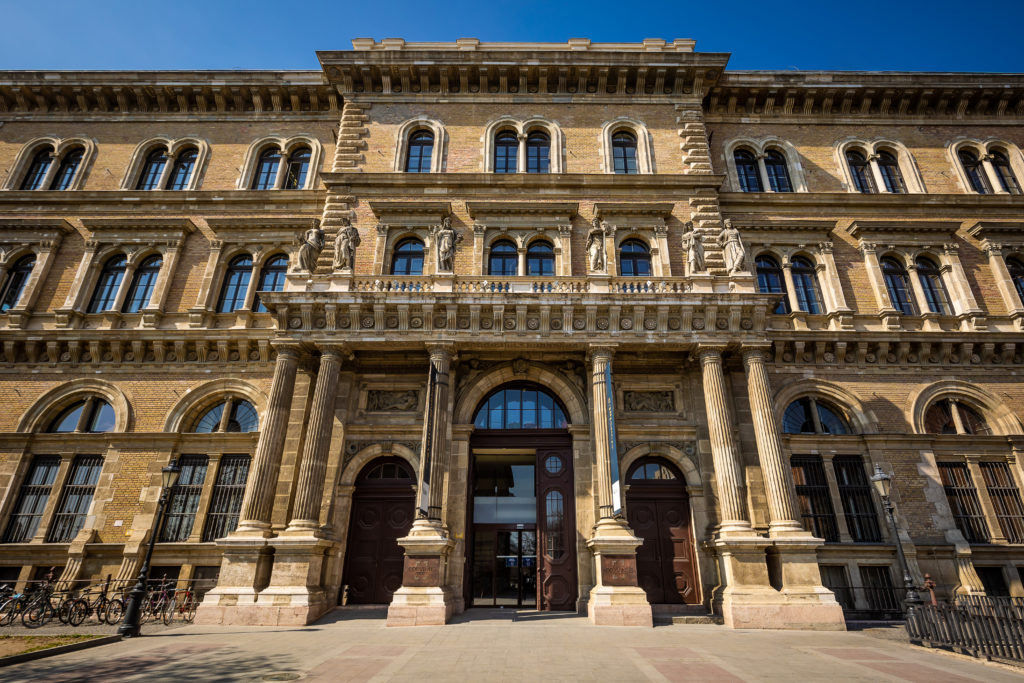Globális Tanulmányok Intézet
Globális Tanulmányok Intézet alá tartozó tanszékek
A Globális Tanulmányok Intézet 2022-ben jött létre, de valójában csak nevében új e formáció, hiszen az Intézetet alkotó két tanszék – a Nemzetközi Kapcsolatok Tanszék és Világgazdasági Tanszék – több mit fél évszázada működik az egyetemen, se e két közösség együttműködése a 2022-ben létrehozott Intézetnél jóval régebbre nyúlik vissza. Intézetünk az oktatás mindhárom szintjén (alap-, mester- és PhD-képzés) jelen van: a nemzetközi tanulmányok magyar és angol nyelvű alapképzés mellett otthont ad két angol nyelvű mesterképzésnek – nemzetközi tanulmányok, illetve nemzetközi gazdaság és gazdálkodás – emellett pedig két programot is működtet a Nemzetközi Kapcsolatok és Politikatudományi Doktori Iskola képzésében. E programok az Egyetem legnépszerűbb képzései közé tartoznak, melyekre évről évre jelentős túljelentkezés van. Az Intézet oktatói, kutatói multidiszciplináris, sokszínű, és korunk kihívásaira reflektáló oktatási és kutatási portfolióval és jelentős nemzetközi kapcsolatrendszerrel rendelkeznek. A két tudományterület közötti szinergiákat kihasználva az Intézet a korábbiaknál is jelentősebb oktatási és kutatási eredményekre törekszik folyamatos szak- és tárgyfejlesztések, nemzetközi kutatások és publikációk révén.

The V4 Region and the War in Ukraine: Lessons in Foreign Information Manipulation and Interference
The core objective of the project is to prove and illustrate the coordinated nature of Russia’s efforts to conduct foreign information manipulation and interference (FIMI) against the Visegrad countries in connection with the war in Ukraine. The term ‘foreign information manipulation and interference’ is the definition commonly used by both the EU and NATO since January 2023; hence, it is a suitable theoretical framework also for the present research. Regarding Russian FIMI against the Visegrad region, important research projects have already been conducted in all four countries. The main channels of Russian disinformation have been explored, including certain actors and the financial background behind them. Many of the core Russian narratives have also been discussed in detail, ever since the beginning of the war in 2014. The main channels of Russian FIMI have also been identified, ranging from ‘troll farms’ to local outlets of the Russian state media and to agents of information. All Visegrad countries have employed certain countermeasures against these channels. However, what has not been yet researched in depth is the actual modus operandi of Russia’s contemporary FIMI apparatus against the Visegrad region.
Analogies from the Soviet past may serve as guidelines only about the theoretical background and about the nature of strategic political guidance. Meanwhile, pre-1991 knowledge provides little actual information on how Moscow employs such methods in the 2020s.
Hence, the project suggests an innovative methodology (described below) for assessing, how Russia has been planning and conducting FIMI against the Visegrad region, based on the example of the war in Ukraine. The core objective is to prove that Russian FIMI against the Visegrad region is conducted in a strongly centralised way, thus FIMI actions against the individual Visegrad countries constitute parts of a
larger, regionally designed, unified strategy. Should the project be able to prove the heightened, closely coordinated nature of Russian FIMI against the region, it could serve as an argument for strengthening both national and international resilience efforts and countermeasures against it, including media literacy. From then on, the existence of a centralised, overarching FIMI threat would become a proven fact.

The Institute of Global Studies in Corvinus University of Budapest has widespread knowledge as well as practical experience in studying both disinformation activities and the war in Ukraine. Several colleagues have been dealing with related issues within their research portfolios, and the project can count on their expertise. The coordinator and leading researcher of the project, Dr. Andras Racz is a senior expert on Russian security studies, including particularly disinformation and the war in Ukraine.
Regarding the research partners:
Res Publica Foundation (Poland) has both its own competent research team and may also rely on the expertise of several visiting fellows specialized on the subject. They were selected based on their expertise on information resilience, disinformation and Russia. They have cooperated with Corvinus in the past on individual level in various research and advocacy projects. In the project Res Publica Foundation will cover the case of Poland.
Prague Security Studies Institute (Czechia) has an in-depth understanding of both the Russian information operations and well of their security-related implications, particularly the Regional Security Programme. Corvinus has not cooperated with PSSI in the past, but they were selected based on their expertise on information resilience, disinformation and Russia. They will cover the case of Czechia in the project.
Adapt Institute (Slovakia) is specialized in defense and security policy, as well as countering disinformation and strengthening democracy via improving media literacy. They have a separate programme on disinformation and democracy, besides running the infosecurity.sk project. They have not cooperated with Corvinus in the past, but they were selected based on their expertise on information resilience, disinformation, and Russia. The Adapt Institute will cover the case in Slovakia.
All in all, the research consortium consists of teams, where all contributors are experts on the core subject while also have their own individual, complementary specializations. Such a combination of teams and expertise will ensure both the quality of the planned research as well as the wide outreach.
Contacts:
Website: https://www.visegradfund.org/

